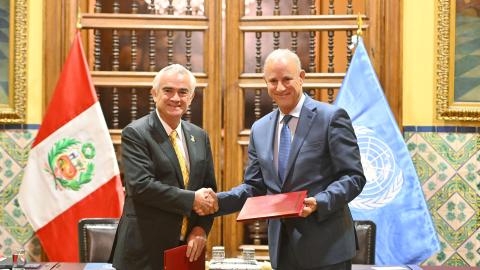Announcement
To be able to surmount the trap of low capacity for growth in which the region is mired and avert a third lost decade, the Economic Commission for Latin America and the Caribbean (ECLAC) is calling on countries to scale up and improve productive development policies (PDPs) that would foster the productive transformation and growth in productivity of their economies.
This is according to ECLAC’s new flagship document Panorama of Productive Development Policies in Latin America and the Caribbean, 2024: How can the region advance the great productive transformation it needs?, the first edition of which was presented today in the framework of a web seminar that brought together some of the most prominent figures who, in practice in their respective countries or at some of the most globally renowned multilateral entities and think tanks, shape international debate on these issues.
The publication – unveiled by the organization’s Executive Secretary, José Manuel Salazar-Xirinachs, and Marco Llinás, the Director of its Production, Productivity and Management Division, which is in charge of preparing the report – presents ECLAC’s renewed vision regarding productive development policies, provides an analysis of the efforts that the region’s countries have been making on these policies, and puts forth concrete proposals for scaling up and improving them in Latin America and the Caribbean. To that end, it offers more than 80 practical recommendations, encapsulated in seven pillars of action, that seek to orient the region’s countries and their territories on the ”whats” and the “hows” for advancing their productive transformation.
Among its main findings, the document indicates that the efforts the region has been making on productive development policies are marginal in light of the productivity challenge it faces and in light of what other countries are doing in this area. The countries analyzed in the Panorama allocate public resources equivalent to between 0.2% and 1.2% of GDP in PDPs. These figures are very low compared with the 3.5% that some countries belonging to the Organisation for Economic Co-operation and Development (OECD) are estimated to invest.
Furthermore, tax instruments tend to predominate, accounting for 61.5% in the case of Argentina and 87% in Brazil. The exception is Chile, where subsidy instruments prevail, accounting for more than 70% of the total. In addition, resources are dispersed among multiple instruments of limited scope, which atomizes the efforts made and thereby reduces their capacity for impact.
The modern vision of PDPs that ECLAC is promoting emphasizes governance mechanisms and collaboration between key institutions and stakeholders. In this regard, researchers found significant fragmentation among the institutions dedicated to PDPs: the majority of the 33 countries in Latin America and the Caribbean has between five and six entities dedicated to these policies. However, coordination is scant among these institutions. In addition, the data shows that subnational governments contribute with their own resources to financing PDPs in their territories. However, there is great heterogeneity in the efforts made by distinct territories within countries.
According to the assessment made by ECLAC, there are significant opportunities for improving PDP efforts in the region. Thus, to provide guidance to national and subnational governments for scaling up and improving their PDPs, the Panorama presents a broad set of proposals grouped into seven pillars of action:
- Increase efforts in line with the new vision for bigger impact.
- Strengthen multi-stakeholder and multilevel governance.
- Strengthen institutions’ technical, operational, political and prospective (TOPP) capabilities.
- Create and strengthen cluster initiatives in line with production priorities.
- Boost the commitment of all stakeholders, particularly from the private sector.
- Bolster territorialization.
- Adopt a strategic line of internationalization.
The web seminar where the report was presented grouped the discussion into three panels on the challenges of current productive development policies in the region; productive development policy governance and institutions in the region; and subnational efforts on productive development policies in the region.
It featured the participation of prominent specialists, including Annalisa Primi, Head of the Development and Economic Transformation Division at the OECD Development Centre; Fuad Hasanov, Senior Economist at the International Monetary Fund (IMF); José Antonio Ocampo, former Minister of Finance of Colombia and former Executive Secretary of ECLAC; Nicolás Grau, Minister of Economy, Development and Tourism of Chile; Uallace Moreira, Secretary of Industry at the Ministry of Development, Industry, Trade and Services of Brazil; Paola Pabón, Prefect of the Province of Pichincha, Ecuador; Professors Nathan Lane (Oxford University), Charles Sabel (Columbia University), Amir Lebdioui (Oxford University) and Christian Ketels (Harvard University); Gonzalo Rivas, Head of the Competitiveness, Technology, and Innovation Division of the Inter-American Development Bank (IDB); Piero Ghezzi, former Minister of Production of Peru; Camilo Rivera, Deputy Minister of Business Development of Colombia; Rebeca Vidal, Private Sector Evaluation Executive at CAF; and Vidal Llerenas, an expert in productive policy from Mexico.



